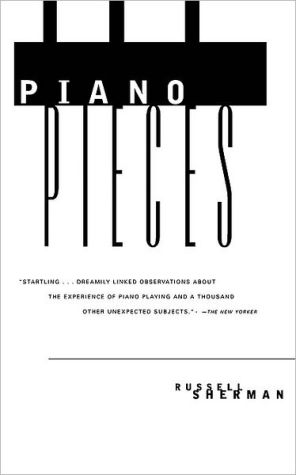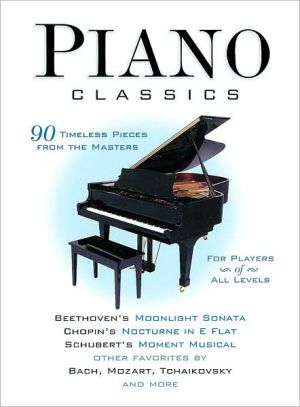Piano Pieces
Russell Sherman has been hailed as "that rarest of performers—a thinking man's virtuoso" (Chicago Tribune), and Piano Pieces is his scintillating excursion into the world of piano and its multiple spheres of affect and influence. From pithy reflections on tone, technique, and the thorny matter of thumbs to ruminations on how such a machine could be the voice and repository of priceless human messages both lyrical and complex, Piano Pieces examines the current status of music, piano-playing,...
Search in google:
Russell Sherman has been hailed as "that rarest of performers—a thinking man's virtuoso" (Chicago Tribune), and Piano Pieces is his scintillating excursion into the world of piano and its multiple spheres of affect and influence. From pithy reflections on tone, technique, and the thorny matter of thumbs to ruminations on how such a machine could be the voice and repository of priceless human messages both lyrical and complex, Piano Pieces examines the current status of music, piano-playing, and pedagogy through the noisy filter of contemporary culture. Katherine Whittamore In Piano Pieces, Russell Sherman treats the piano much the same way Robert Pirsig handled Zen and motorcycles: with deep consideration and love. "The breath, prayers and libido of the fingertips must somehow be transferred to the neutral indifference of the key," Sherman writes, in this astonishingly quotable book; every page drops a golden prose apple. Fingers arc like "a team of wild huskies." The thumb is "the black sheep who is forbidden to roam on the black keys." The piano offers "rare aphrodisiacs of sound." A renowned classical pianist who teaches at the New England Conservatory of Music, Sherman comes at these 88 keys from the vantage of both performer and instructor. The book lacks a conventional narrative, opting instead for a butterfly strategy of quick exploration, then moving on. Hence the "Pieces" of the title; five sections enfold alightings on everything from the specific (the anatomy and musculature of playing) to the overarching (how music unlocks our hearts). The reader soon realizes Sherman's pedagogical style is holistic -- a term he would sneer at, having tagged himself "an old and unregenerate crust." (He's 66.) Here's his idea of homework, for instance: "I have asked one student to prepare a short discourse on the subject of chiaroscuro. . . another to. . . write an essay on the (plant) cycle, another to work up a list of twenty-five similes for the image of a samovar." Such careening well-roundedness informs the text. The book cites everyone from Edward Steichen to Lenny Dykstra (the man's a big sports fan), Rilke to Ben Hogan, Gerard Manley Hopkins to Wayne Gretsky. "Life and music were full of sweet surprises and agreeable detours," as Sherman's own beloved teacher, Edward Steurmann, showed him. "The role and privilege of being a musician implied a life without gloom, without pedantry." Of course, this Whitmanesque approach encompasses some bolt-the-door prose -- "One is either a bird or a horse or a muffin," writes Sherman. Come again? His advice can veer toward the flaky (all musicians should own a pet), and you might part company on his rants; he hates rock and roll and all musical competitions, calling the latter "derangements of values." But his musings on specific pieces (Chopin's G Minor Ballade), and composers (Mozart, in particular, and Haydn) positively soar. Piano Pieces is a jewel, a must for every serious musician's library. Sherman says he wants to explain "what it means to sit in front of a piano and dream, fret, rage, and give thanks." He succeeds, eminently. -- Salon
\ From the Publisher"Startling . . . Dreamily link observations about the experience of piano playing and a thousand other unexpected subjects."—The New Yorker\ "The most original and arresting and powerful pianist today."—Richard Dyer, The Boston Globe\ "I had always thought that words could not add very much value to music. But Piano Pieces opened both my eyes and my ears. Russell Sherman plays on the page with as much mastery as upon the keyboard. His writing is music, is melody, is counterpoint. On hears it even as one reads it. A tour de force. The passages on Chopin are particularly brilliant. Bravo!"—James Lord\ \ \ \ \ \ Katherine WhittamoreIn Piano Pieces, Russell Sherman treats the piano much the same way Robert Pirsig handled Zen and motorcycles: with deep consideration and love. "The breath, prayers and libido of the fingertips must somehow be transferred to the neutral indifference of the key," Sherman writes, in this astonishingly quotable book; every page drops a golden prose apple. Fingers arc like "a team of wild huskies." The thumb is "the black sheep who is forbidden to roam on the black keys." The piano offers "rare aphrodisiacs of sound."\ A renowned classical pianist who teaches at the New England Conservatory of Music, Sherman comes at these 88 keys from the vantage of both performer and instructor. The book lacks a conventional narrative, opting instead for a butterfly strategy of quick exploration, then moving on. Hence the "Pieces" of the title; five sections enfold alightings on everything from the specific (the anatomy and musculature of playing) to the overarching (how music unlocks our hearts). The reader soon realizes Sherman's pedagogical style is holistic -- a term he would sneer at, having tagged himself "an old and unregenerate crust." (He's 66.) Here's his idea of homework, for instance: "I have asked one student to prepare a short discourse on the subject of chiaroscuro. . . another to. . . write an essay on the (plant) cycle, another to work up a list of twenty-five similes for the image of a samovar."\ Such careening well-roundedness informs the text. The book cites everyone from Edward Steichen to Lenny Dykstra (the man's a big sports fan), Rilke to Ben Hogan, Gerard Manley Hopkins to Wayne Gretsky. "Life and music were full of sweet surprises and agreeable detours," as Sherman's own beloved teacher, Edward Steurmann, showed him. "The role and privilege of being a musician implied a life without gloom, without pedantry."\ Of course, this Whitmanesque approach encompasses some bolt-the-door prose -- "One is either a bird or a horse or a muffin," writes Sherman. Come again? His advice can veer toward the flaky (all musicians should own a pet), and you might part company on his rants; he hates rock and roll and all musical competitions, calling the latter "derangements of values." But his musings on specific pieces (Chopin's G Minor Ballade), and composers (Mozart, in particular, and Haydn) positively soar. Piano Pieces is a jewel, a must for every serious musician's library. Sherman says he wants to explain "what it means to sit in front of a piano and dream, fret, rage, and give thanks." He succeeds, eminently. -- Salon\ \ \ \ Publishers Weekly\ - Publisher's Weekly\ Sherman is a noted concert pianist and music teacher who confesses, at the outset of this collection of observations on pianism, music in general and society at large, that he is lazy. Yet, he feels driven to offer "the diary of an old and unregenerate crust." The result is not so much an organized book as a collection of reflections and aphorisms arranged roughly into sections dealing with the essence of piano technique, the teaching of it, the world in which pianism is taught today and thoughts on works of the masters. Sherman is a man of considerable erudition and much wit, whose description of the pianist's finger functions is brilliant, both poetic and allusive. If in assessing the desired pianistic qualities he sometimes becomes too technical for most lay readers, this is redeemed by salty salvos at such btes noirs as piano competitions and electronic popular culture. He fears a whole generation is being lost to the pleasures of serious music, and only the current interest in environmentalism gives him the faintest hope for the future of the species. Reading a book in endless brief bites can be wearing, however, and it seems a pity that Sherman couldn't bring himself to put his very worthwhile thoughts into a more coherent, cohesive framework. (Apr.)\ \ \ \ \ Library JournalSherman is a concert pianist who teaches at the New England Conservatory. Here he offers a rambling collection of aphorisms or mini-essays that gives the impression of snatches one might hear while listening in on him giving piano lessons. Metaphor and simile abound: the hand is like a Spanish dancer, the hand is like a Ferris wheel; the score is a map, the score is the boss; playing the piano is like golfing, playing the piano is like hunting. There are also thoughts on the interpretation and the philosophy of music, as well as the nature of art, the problem of youth today, and so on. This book will appeal to those who enjoyed Sherman's appearance in The Not Quite Innocent Bystander (LJ 3/15/90), a book on his piano teacher, Edward Steuermann.-Michael Colby, Univ. of California, Davis\ \








